Fujin Street (富錦街) in Taipei’s quiet, tree-lined Minsheng Community (民生社區) is known by a different name nowadays. People call it Fujin Tree Street (富錦樹街), and the reason is pretty self-explanatory. Take a stroll along the short lane dotted with boutiques, posh cafes and design shops, and you will find a string of stylish establishments all belonging to the Fujin Tree Group (富錦樹).
You have the Fujin Tree coffee shop, two lifestyle stores aimed at men and women as well as a home decor boutique. And there is Beams, a Japanese fashion store, in addition to a few other Japanese and European brands, which were introduced to Taiwan by the same group.
The group’s latest invention, At Fujin Tree — Taiwanese Cuisine & Champagne, offers a contemporary rendering of traditional Taiwanese dishes and matches them with, yes, you guessed it, champagne. Located on Dunhua North Road, the restaurant opened in December last year and has quickly become a much talked about spot.
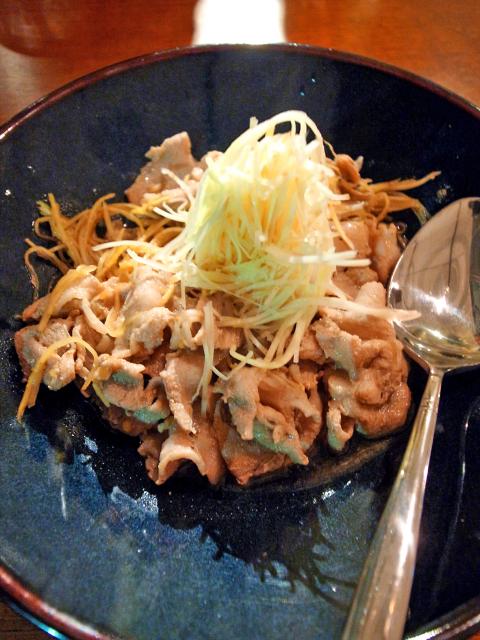
Photo: Ho Yi, Taipei Times
Everything spells elegance and refinement here. Adorned with a garden seating area, the space lets in ample sunlight through the spotless floor-to-ceiling glass windows and doors. Against the simple backdrop of cement floors and white walls, several huge flower bouquets, twigs and plants are hung from the ceiling, lending the interior a sense of playfulness and creative vigor.
As for the food, it is properly prepared, fine to look at and good to eat. The attempt to pair it with the French sparkling wine, however, somehow misses out what it aims to accomplish: a culinary spark.
Catering to a contemporary palate, dishes on the compact menu go easy on the spices. The stinky tofu with kimchi (泡菜臭豆腐, NT$450), for example, consists of comparatively mellow-tasting tofu and sweetly seasoned pickled cabbage. Also lighter in taste, Formosa vermicelli (寶島米粉, NT$400) is an up-scale version of the quasi-essential Taiwanese street food, mixing crisp cabbage, shrimp, pork and mushroom with rice vermicelli and cooked al dente.
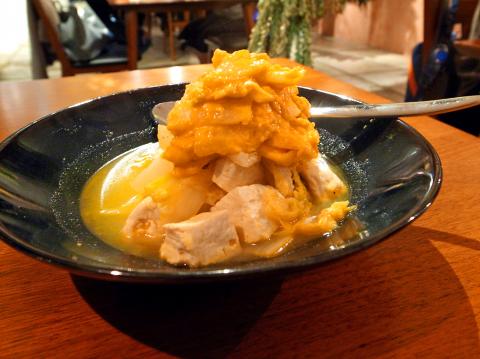
Photo: Ho Yi, Taipei Times
For something heavier, the oysters with cut up dough sticks and garlic sauce (油條蒜蓉鮮蚵, NT$550) deserves a special mention for maintaining the crispy texture of the deep-fried dough sticks, or youtiao (油條).
And fennel and egg make a remarkably delicious combination in the fennel omelet (茴香烘蛋, NT$450).
Other orthodox Taiwanese dishes include ginger intestine with soy sauce (醬味薑絲大腸, NT$450), pork ribs and taro (芋香排骨, NT$590) and squid and sea snail soup (魷魚螺肉蒜, NT$850).
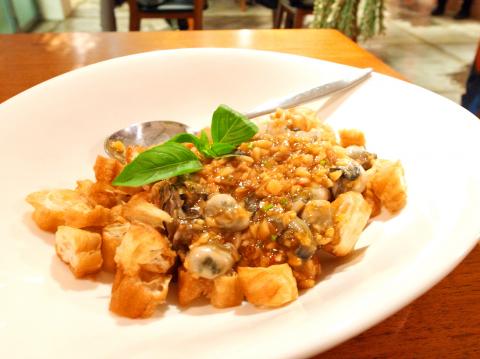
Photo: Ho Yi, Taipei Times
Since wine is an integral part of the dining experience, our party chose the Bernard Tornay Carte d’Or Brut Champagne (NT$450 per glass, NT$2,500 per bottle) to go with our meal. But nothing sparkled. The aroma of the wine was largely eclipsed by the food, leaving us wondering if the kitchen should spend time fine-tuning the menu to make the pairing work.
The restaurant’s champagne collection features bottles from popular producers such as Perrier-Jouet and Krug, which can cost up to NT$20,000. There is also a selection of sparkling, red and white wine priced between NT$800 and NT$4,600.
Service is as friendly as can be expected in a chic place like Fujin Street, but the wait staff were slow to respond to our requests on the not-so-busy Sunday night we visited. Another thing to keep in mind is that pairing the fancier version of Taiwanese cuisine with champagne doesn’t come cheaply. It is a good idea to come in groups to share the food and the bill as well.
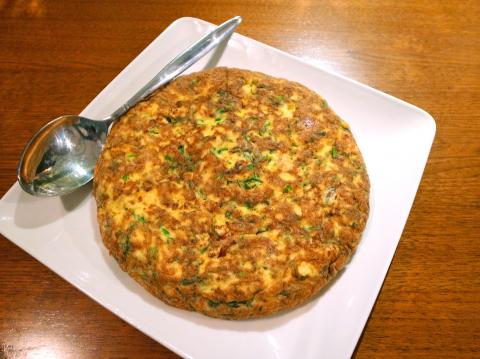
Photo: Ho Yi, Taipei Times
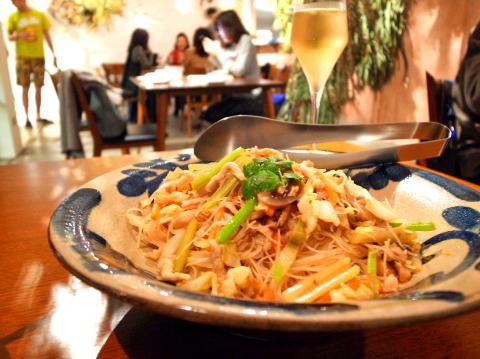
Photo: Ho Yi, Taipei Times

The canonical shot of an East Asian city is a night skyline studded with towering apartment and office buildings, bright with neon and plastic signage, a landscape of energy and modernity. Another classic image is the same city seen from above, in which identical apartment towers march across the city, spilling out over nearby geography, like stylized soldiers colonizing new territory in a board game. Densely populated dynamic conurbations of money, technological innovation and convenience, it is hard to see the cities of East Asia as what they truly are: necropolises. Why is this? The East Asian development model, with

June 16 to June 22 The following flyer appeared on the streets of Hsinchu on June 12, 1895: “Taipei has already fallen to the Japanese barbarians, who have brought great misery to our land and people. We heard that the Japanese occupiers will tax our gardens, our houses, our bodies, and even our chickens, dogs, cows and pigs. They wear their hair wild, carve their teeth, tattoo their foreheads, wear strange clothes and speak a strange language. How can we be ruled by such people?” Posted by civilian militia leader Wu Tang-hsing (吳湯興), it was a call to arms to retake

This is a deeply unsettling period in Taiwan. Uncertainties are everywhere while everyone waits for a small army of other shoes to drop on nearly every front. During challenging times, interesting political changes can happen, yet all three major political parties are beset with scandals, strife and self-inflicted wounds. As the ruling party, the Democratic Progressive Party (DPP) is held accountable for not only the challenges to the party, but also the nation. Taiwan is geopolitically and economically under threat. Domestically, the administration is under siege by the opposition-controlled legislature and growing discontent with what opponents characterize as arrogant, autocratic

When Lisa, 20, laces into her ultra-high heels for her shift at a strip club in Ukraine’s Kharkiv, she knows that aside from dancing, she will have to comfort traumatized soldiers. Since Russia’s 2022 invasion, exhausted troops are the main clientele of the Flash Dancers club in the center of the northeastern city, just 20 kilometers from Russian forces. For some customers, it provides an “escape” from the war, said Valerya Zavatska — a 25-year-old law graduate who runs the club with her mother, an ex-dancer. But many are not there just for the show. They “want to talk about what hurts,” she